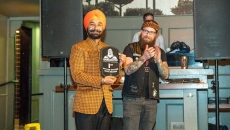The realm of the sciences is a vast field of information, characterized by unbounded theories, questions, and explorative queries. The research of these topics then goes on to better the lives of humankind, creating the backbone of global progress, advancement, and breakthroughs. Accomplishing all this and more, such is the story of the scientist, educationist, author, and Sikh theologian, Dr. Hardev Singh Virk, who is a world renowned physicist and celebrated author. Dr. Virk has published 450 research papers, 45 books, and nearly 200 articles on science education, science policy, the Sikh religion and Punjabi literature. Presently, his research entails working on the issue of groundwater contamination in Punjab, due to uranium and heavy metals, and its mitigation.
Born in Gujranwala's Kamoke Mandi, now in Pakistan, Dr. Virk recalls having spent most of his childhood at his maternal grandmother’s home in the care of his beloved mother. He distinctly describes memories of tough times, especially in light of a decade-long property dispute, “Sometimes, we had to live from hand to mouth with a dim hope of keeping the body and soul together. Life went through many trials and tribulations, but I believe this helped me build my character.” Regardless of any external circumstances, Dr. Virk reveals that he always excelled in the field of education at school. Upon encouragement from his teachers, who were always of the utmost support to him, Dr. Virk decided to pursue a Bachelor of Science Degree at Govt. Mohindra College, Patiala.
Yet again, he received guidance to nurture his gift of intellectualism under the counsel of Indian physicist and pioneer in Cosmic Rays Physics, Dr. Piara Singh Gill, at the Aligarh Muslim University, Aligarh. Here, he went on to receive his Masters in Physics in 1963. Dr. Virk describes working under Dr. Gill as an honor and privilege. Soon, this experience would be the first step to opening up doors to joining the galleries of the greatest world scientists as colleagues, mentors, and teachers. Through sheer hard work, brilliance, intelligence, and his distinct and unique accomplishments, Dr. Virk arose to join the company of elite scientists and scholars of national and international prominence.
In 1972, Dr. Virk obtained his Doctorate in Nuclear Physics from Marie Curie University, Paris. Here, he created history by writing a thesis rejecting the hypothesis of his own Ph.D. supervisor. This proved to be a turning point in his life and he resolved to uphold the truth at all costs. Moving forward, with hardly any facility in his own area of research, he took a plunge in the interdisciplinary areas of Nuclear & Radiation Physics; Geochronology; Earthquakes & Environment; Ion Tracks & Nanotechnology; History & Philosophy of Science; Sikh Religion and Punjabi Literature.

Taking a look at his career, Dr. Virk secured the position of a government college lecturer at the young age of 21 but did not join, on the advice of his teacher, and went on to serve in Guru Nanak Engineering (GNE) College, Ludhiana from 1963 to 1965. He then served at Punjabi University in Patiala from 1965 to 1979, and Guru Nanak Dev University (GNDU) in Amritsar from 1979 to 2002. At GNDU, Dr. Virk started a new physics department from scratch, navigating through the challenges of university administration, and creating infrastructure for teaching and research from the grassroots. The popular and loved professor retired from GNDU in June 2002 after serving as Director of Research and Dean of Academic Affairs. He was re-employed as Director of Research at DAV Institute of Engineering & Technology, Jalandhar, where he served as Director Nanotechnology Center from 2008 to 2011. His professional endeavors also include working as a Visiting Professor at SGGS World University, Fatehgarh Sahib from 2013 to 2017, and Professor of Eminence at Punjabi University, Patiala from 2017 to 2019. Presently, he sits on the posts of Adjunct Professor at Eternal University Baru Sahib, Himachal Pradesh and Professor of Eminence (Honorary) at SGGS World University, Fatehgarh Sahib, Punjab.
Recently, Flogen Technologies has proposed to organize the Virk International Symposium on Physics, Technology and Interdisciplinary Research for Sustainable Development, in 2022, in Phuket, Thailand, to celebrate Dr. Virk’s research contributions along with nine other Nobel Laureates. The symposium is dedicated to honoring the lifetime achievements of Dr. Virk, as he is a pioneer in interdisciplinary research in India, using heavy ion beams for irradiation of minerals, glasses, polymers and other insulators. Dr. Virk has been instrumental in using Radon concentration in indoor air, soil, and groundwater for estimation of health hazard effects and earthquake prediction in the Himalayas to develop applications for sustainable development of the region.

Reflecting on his career and professional milestones, Dr. Virk shares, “20 years after retirement, I am still actively working on research projects in India and Canada. That said, although 90% of my time is devoted to scientific research, most of my awards are from the literary field.” Dr. Virk is recipient of several awards, including the Senior Associateship of International Centre for Theoretical Physics (ICTP), Trieste, Italy (1988-1993); Shiromani Award as Best Writer of Scientific Literature in Punjabi awarded by Punjab State Languages Department (1993); S. Kartar Singh Dhaliwal Award for Scientific & Literary Writing in Punjabi by Punjabi Sahit Academy, Ludhiana (2000), and Honorable Mention Award of Templeton Foundation (USA) for a Project on Global Perspectives of Science & Sikh Religion (2005).
Dr. Virk’s literary prowess is of the highest esteem, and he has also penned a captivating and engaging autobiography, My Journey in Science: Autobiography of an Indian Scientist. Dr. Virk writes about more than just his scientific research and personal journeys, especially exploring themes of Sikhism. He was always influenced by his mother's recitation of Gurbani at Amritvela from his early childhood; he himself started reciting Nitnem Banis during his college years.
The literary genius elaborates, “When people ask me why I love Sikhi, I tell them it is in my genetic code. My mother did so much recitation of Gurbani (utterances of the Gurus) when I was in her womb, that it changed my genetic code. If transmutations are possible in radioactive substances in nature and can be induced artificially in a research laboratory where I worked in the Marie Curie University of Paris, then why not at the biological level in a fetus?”. As expressed in the foreword of Dr. Virk’s autobiography by Dr. Daya Singh Sandhu, Director of Research at Lindsey Wilson College, Columbia, Kentucky, Dr. Virk’s ingenuity in applying scientific explanations to religious or spiritual questions is reputed to be at par excellence. With fascinating and thought-provoking scientific questions for others to explore, it is evidently very difficult, if not impossible, to dispute Dr. Virk’s assertions and logical explanations. An example of his notable works in this area includes his critical essay, “Implications of God Particle for Science and Gurbani”.
Having traveled through 50 countries for his academic pursuits, Dr. Virk vividly remembers being the only Amritdhari Sikh in those times, particularly in the 1970s of Europe. He discloses that wearing a turban was prohibited at many places in France, including university convocations and restaurants. Given the lack of ethnic and religious awareness, many thought that he was Muslim and the ignorance would sometimes go as far as the allusion to Dr. Virk as “Pakistani” in the media. Recounting tales from his experiences, Dr. Virk shares a story, “One day, some Saudi Arabian girls, wearing hijabs, entered the scene during my time in Paris. The French students began throwing pieces of bread on them, born out of racist sentiment, of course. A fist fight broke out between the Saudi Arabian and French boys. The result? They not only backed off from teasing the Saudi Arabian girls, but they stopped bothering me, too, as a turbaned Sikh.”
After this incident, Dr. Virk describes that his treatment in international festivals was nothing short of a maharaja, or king. In fact, his colleagues would use his name for exclusive access to hard-to-book resorts, for instance. All in all, apart from a few misunderstandings and incidents, the science legend mostly enjoyed his status as a Sikh man with a turban. Commenting on the topic of discrimination, Dr. Virk details that scientists are mostly secular and look at one’s work more than their identity. Nevertheless, after the 1980s, many others from Punjab began relocating across the world, and there has been a prominent change in the last decade, notably, as turbaned Sikhs can now be found all over the globe.
In regards to the state of things in current days, Dr. Virk believes that the narrative of Sikhism must be changed at a global level. According to him, the Sikh psyche must, along with “love for martyrs”, also prioritize “love for scholars” and changemakers, as the Jews have done. Dr. Virk’s mindset is that education is a catalyst of any such change, both within the Sikh community, and as well as globally. As he puts it, “The promotion of science education is important. If more Sikh kids go into Science, Technology, Engineering and Math (STEM), there can be a change in the overall status and thinking of Sikhs, and the larger community”. Looking at his own personal front, Dr. Virk and his wife, Ranjit Kaur, a qualified teacher with Bachelor of Education and Master of Arts in Music, have raised their three sons to become qualified engineers with master degrees in their professions. The elder two sons are settled in Surrey, BC, Canada while the youngest one is in San Jose, California, USA.
Undoubtedly, Dr. Virk’s quest for knowledge, influential research, and long list of accomplishments is unmatched. Not only is he a role model to scientists, researchers, academics, authors, and philosophers, the multitalented and multifaceted scholar is a symbol of pride for our communities. Persevering through an array of hardships, he has developed a personality and presence laced with courage and determination, in addition to his intellectual caliber. Breaking boundaries and making possible the impossible are actions of second nature to Dr. Virk, made crystal clear by his unprecedented career, unbreakable spirit, and significant, everlasting contributions to the world of Science, Sikhism, and beyond.
Photos courtesy of A Master Media.






